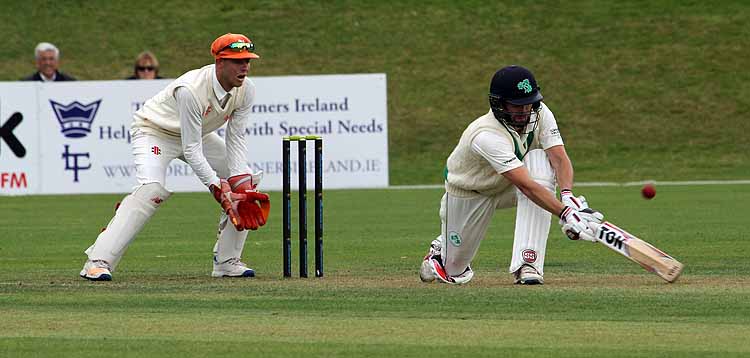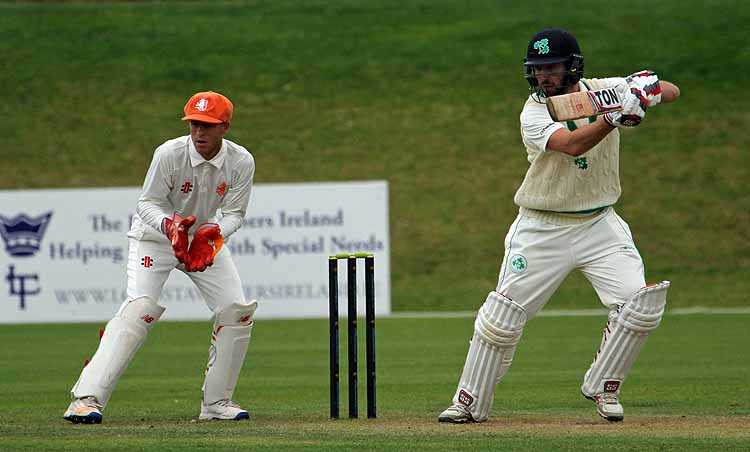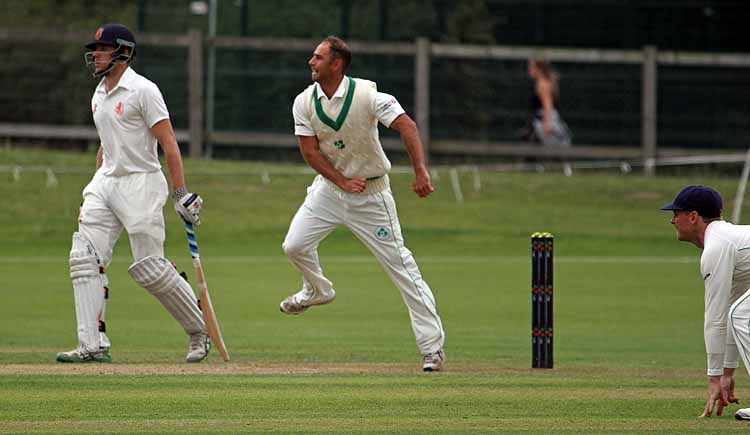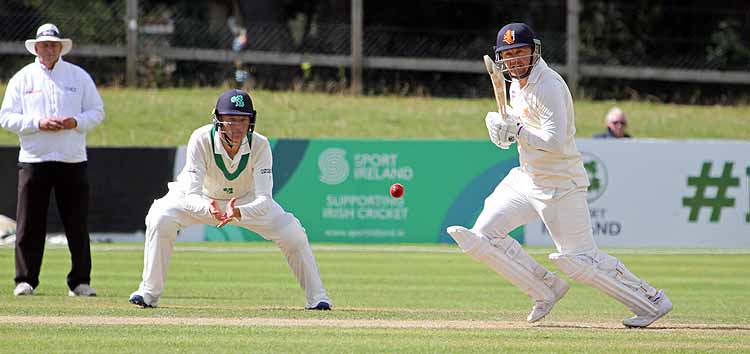

Day 1
It was unequivocally Ireland's day at Malahide as they completed the first day of their Intercontinental Cup match against the Netherlands on 292 for two after having been put in to bat by Dutch skipper Peter Borren.
All four members of the Irish top order contributed significantly, but the keystone of the innings was Andrew Balbirnie, who batted for more than four and a half hours and by the close had reached an unbeaten 130 - his maiden first-class century. He went to the hundred off 176 deliveries, and has faced 238 in all, hitting 16 fours and a six.
 Swept by Andrew Balbirnie
Swept by Andrew Balbirnie
He gave one clear chance, on 109, but apart from that has batted with impeccable concentration, keeping the scoreboard moving and punishing anything loose.
A great platform was created by openers Ed Joyce and William Porterfield, who put on 75 for the first wicket before Borren had Joyce brilliantly caught by Saqib Zulfiqar at square leg when he had made 43.
Then Porterfield and Balbirnie added 67 for the second, the Irish captain going on to a patient 149-ball 60. He survived a long period of containment by Quirijn Gunning and Borren either side of lunch, Borren bowling a sustained 15-over spell which included eight maidens and conceded just 31 runs, but when Shane Snater returned to the attack and forced him to play, he edged to second slip where Logan van Beek took a good low catch.
But that was to be the last Dutch success of the day, and Balbirnie and John Anderson batted through to the close, putting on exactly 150 in an unbroken third-wicket stand which ensured that Ireland dominated the day. Anderson had made 57 from 125 deliveries, with eight boundaries.
Perhaps going into the match a bowler short and with an attack heavily based on seam, the Netherlands did not help their cause by putting down several catches in the course of the day, at least two of which were straightforward.
But the three frontline seamers, Logan van Beek, Snater and Gunning, all performed with great persistence and all three deserved better figures, while Borren, bowling a longer spell for his side than he had since 2011, led from the front and kept the scoring within bounds when the Irish batsmen threatened to take complete control.
He finished the day with one for 57 from 24 overs, the most economical of the six bowlers he tried, although he was rivalled by Gunning, whose 23 overs cost just 64 runs.
The Dutch will need to take quick wickets on the second day on Wednesday morning in order to have any chance of fighting their way back into this match, while Ireland will be looking to continue their progress and set their opponents a really massive target.
The weather may also influence the second day, with showers predicted.
Day 2
If the first day ended with a clear advantage to Ireland, that had turned into a near-stranglehold by the close of the second at Malahide on Wednesday, as the Netherlands ended with a deficit of 337 with only five first-innings wickets in hand.
On 292 for two overnight, Ireland had to wait 90 additional minutes to resume after a heavy shower swept across the ground just as the umpires were walking out at 11 o’clock, but when they did Andrew Balbirnie and John Anderson carried on from where they had left off on Tuesday evening.
 Andy Balbirnie reaches 200
Andy Balbirnie reaches 200
They extended their third-wicket stand to 183 before Shane Snater, who had bowled well throughout with minimal luck, induced Anderson, on 74 to edge a well-directed delivery through to keeper Tobias Visée.
The hour’s play before lunch saw Ireland add 62 runs, Gary Wilson lending excellent support as Balbirnie, continuing to play with great discipline and surviving one clear chance to Peter Borren at first slip, moved on to 156 by the interval.
The question now was how long skipper William Porterfield would keep the Dutch in the field, and it was evident that a double-hundred for Balbirnie was at least part of the agenda.
He and Wilson put on 76 together, but when the latter had made 39 he hooked a Snater delivery into the hands of Quirijn Gunning at deep fine leg, and two more wickets for the Dutch seamer quickly followed: Kevin O’Brien, after hitting Max O’Dowd for four and six, holed out to Saqib Zulfiqar at deep backward square, and Simi Singh was trapped in front next ball.
This was the cue for Balbirnie, who had now reached 185, to go onto the attack, and he moved onto 200 three overs later; but it was Jacob Mulder who went after a tired Dutch attack, smacking a 22-ball, unbeaten 38 which included two fours and three sixes.
Balbirnie finished on 205, his marathon innings lasting more than seven hours and taking 336 deliveries, including 23 fours and two sixes; he was particularly strong square of the wicket but also drove impressively through cover and mid-off.
Snater, who bowled well throughout the innings, deserved even better figures than his five for 116 from 36 overs, while Gunning was still more unfortunate in that he finished wicketless, his 35 overs yielding 137.
Set to chase Ireland’s 477 for six, the Dutch had scarcely started their reply before rain again intervened, and tea was taken early.
Boyd Rankin quickly established himself as the danger man, causing problems for all the Dutch top order, and his pace and bounce accounted for Wesley Barresi, caught in the slips in the fourth over, and debutant Saqib Zulfiqar, who could only fend a short delivery to short leg.
That left the Netherlands on 9 for two, but when Ben Cooper joined Dan ter Braak, another of the debutants in the side, this pair steadied the ship, adding 83 in 30 overs before Tim Murtagh trapped Ter Braak in front for 32.
The situation demanded discipline, but with leg-spinner Jacob Mulder operating at one end and the pacemen rotating at the other, this proved to be more than the Dutch middle order could manage.
Stef Myburgh’s dismissal was perhaps unfortunate, as after hitting three excellent boundaries his full-blooded pull off Mulder was well caught by Kevin O’Brien at short midwicket, but Peter Borren’s attempted slog-sweep before he had scored was at best reckless in the context of the game.
Only Cooper seemed to be in control of the situation, and he had moved on to 81 by the close, supported in the final eight overs of the day by Max O’Dowd.
Apart from Rankin’s menace, Murtagh, Peter Chase and, briefly, O’Brien all maintained the pressure on the Dutch batsmen, while Mulder always looked likely to achieve a breakthrough.
Still needing 188 to avoid the follow-on, the Netherlands will face a daunting task on the third day - Thursday 17 August, while Ireland will be keen to finish the innings off quickly and - with the forecast for Friday less than promising - press on towards the outright victory they need to stay within reach of Intercontinental Cup rivals Afghanistan.
Day 3
A much more evenly-balanced third day in Malahide still ended with Ireland in a commanding position, having taken first-innings points and extended their lead of 102 to 269 by the close.
But the Netherlands, resuming on 140 for five and needing a sustained batting performance in order to avoid the follow-on, produced exactly that, largely thanks to a record-breaking seventh-wicket stand of 160 between Max O’Dowd and Logan van Beek.
 John Anderson bowling
John Anderson bowling
The day started well for Ireland, with Ben Cooper adding just a single to his overnight score. He was dropped by Andrew Balbirnie at second slip off Tim Murtagh, but the double-centurion made amends in Murtagh’s next over by accepting a more difficult chance in the same position.
That brought Van Beek in to join O’Dowd with 179 still needed to make Ireland bat again, but the home side would have no further success for 43 overs as the Dutch pair gave a demonstration of disciplined, positive batting in adverse circumstances.
They also exposed the limitations of an Irish attack in which only Boyd Rankin was consistently menacing. Leg-spinner Jacob Mulder came in for some particularly harsh treatment as O’Dowd went on to complete a maiden international century and Van Beek also posted his highest score for the Netherlands, making 76.
O’Dowd was the first to go, as Rankin returned with the new ball and induced a snick to Balbirnie, again at second slip. He had made 105 from 151 deliveries, with 16 fours and one six.
In his next over the tall Irish paceman struck again, this time removing Van Beek, who edged to Ed Joyce at third slip.
But by this time only 14 were needed to avoid a follow-on which was now wholly theoretical: it was hard to imagine Porterfield enforcing it after the work his bowlers had had to do.
In fact Tobias Visée and Shane Snater continued the Dutch fightback, adding another 38 for the ninth wicket, and with Visée making a valuable 30 and sharing a last-wicket stand of 23 with Quirijn Gunning, the deficit had been reduced to 102 before Visée became Rankin’s fifth victim.
Rankin finished with five for 49, with two apiece for Murtagh and Mulder.
Ireland suffered an early setback when they batted again, Joyce caught by substitute Fred Klaassen off Van Beek’s bowling, but then Porterfield and Balbirnie shared a second-wicket partnership of 113 in 31 overs.
Porterfield had two notable strokes of good fortune: one when, on 44, he survived a sustained appeal for a catch in the gully which was turned down, the other six runs later when, having reached his second half-century of the match, he was put down at midwicket off O’Dowd’s bowling.
With Peter Borren off the field with an injured finger Wesley Barresi had taken over the captaincy, and when the total had reached 116 he elected to try his own occasional off-spin.
He was almost immediately successful, first bowling Balbirnie for a 94-ball 50 and then dismissing Gary Wilson in the same way. In between, Quirijn Gunning’s excellent performance in both innings had at last been rewarded with a wicket, John Anderson edging him through to keeper Visée.
Three wickets had fallen for 14 runs in the space of just 13 deliveries, but the lead was now 241, and Porterfield and Kevin O’Brien added another 28 by the close, the former moving onto 89.
The initial issue on Friday (18 August) will be how long the Irish captain decides to bat on before setting the Dutch a target and giving his bowlers the opportunity to bowl the opposition out and complete the outright victory Ireland need to stay in touch with rivals Afghanistan.
Day 4
William Porterfield's 16th International century wasn't enough to earn Ireland victory on the final day of their rain-affected Intercontinental Cup clash against the Netherlands at Malahide.
Resuming on their overnight 167-4- an overall lead of 269, the Irish skipper batted for just 11 more overs on Day 4 before declaring for the second time in the game.
 Boundary for Stephan Myburgh
Boundary for Stephan Myburgh
By then the Warwickshire batsman had shown all his class in an excellent 108 (11 fours and a six) while Kevin O'Brien had chipped in with a quick-fire 50 (5 fours and 2 sixes).
Wesley Barresi was the man to finally claim Porterfield's wicket to give the stand-in Dutch skipper figures of 3-42 while Quirijn Gunning (2-63) was the only other wicket-taker of note second time around.
Ireland's final total was 240-7 leaving the visitors to chase a victory target of 343 in 83 overs, and if it looked a big ask at the start, it got worse in the first over of the reply as Tim Murtagh trapped Barresi lbw without scoring.
The Netherlands dug in after that and a second wicket partnership of 107 between Stephan Myburgh and Dan ter Braak helped ensure that they would leave Dublin with a share of the spoils.
Myburgh hit 14 fours in his 85 which came off just 98 balls while ter Braak made an obstinate 23. That, and the occasional final day shower meant that the home side were kept at bay in their quest for a full quota of points.
Simi Singh was best with the ball for Ireland in the second innings with 2-19 as the Dutch saw it out well - Ben Cooper (37*) and Peter Borren (25*) - ensuring there would be no further damage.
A final total of 186 for 4 completed the formalities leaving Ireland top of the table for now. They do however need Afghanistan to slip up in one of their two outstanding games and the small matter of a win over Scotland in November to have any chance of landing a fifth Intercontinental Cup success.
